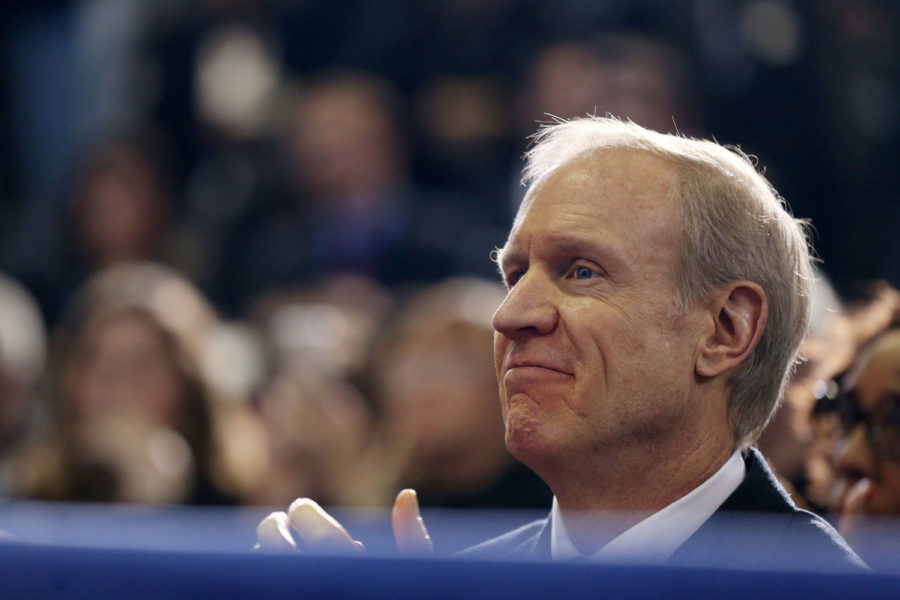Illinois’s lost year about to become two as budget cliff nears
May 25, 2016
Illinois lawmakers have been busy in the last week of the regular legislative session. They moved to establish a youth-only turkey hunting season, set standards on where podiatrists can perform amputations and allowed for the adoption of retired police dogs.
Yet the Land of Lincoln remains the only state in the nation without a budget, mired in the longest such standoff in its history.
After leaving the government since June without a plan for what to spend and how, the Democrat-led legislature and Republican Gov. Bruce Rauner have until May 31 to approve one by a majority vote. If not, for the rest of the year it will take three-fifths of the General Assembly to do so, making a compromise considerably harder to reach.
Advertisement
“It’s the worst situation I can remember in the 50 years I’ve been around state government by far,” said former Gov. Jim Edgar, a Republican who served two terms in the 1990s. “Every day we go without a budget it gets much worse. It does permanent damage.”
Illinois has been wracked by political discord since Rauner, a former private-equity executive, took office in January 2015 and sought to use the spending plan to push through curbs to labor unions, property-tax reductions and workers-compensation insurance changes he said would boost the economy. The proposals encountered resistance from Democrats, who want higher taxes on the wealthy to close a deficit left after temporary increases lapsed.
If no deal is struck, the consequences will become more dire: Prisons may run out of food, schools may not open on time, and the state’s credit rating — already the lowest in the U.S. — is at risk of falling even further as the government’s deficit continues to grow. Wary of Illinois’s finances, investors demand yields of 3.4 percent on its 10-year bonds, about 1.8 percentage points more than top-rated debt, according to data compiled Bloomberg. That gap is up from as little as 1.1 percentage point two years ago.
“Anybody that requires state dollars to run their operations, there’s reason to be concerned,” Jason Leahy, executive director of the Illinois Principals Association, said in an interview. “We’re at a critical juncture.”
Without any agreement to close the deficit, Illinois has been spending about $500 million more than it brings in each month as stop-gap measures, court orders and consent decrees keep the government from shutting down. It’s poised to end the fiscal year on June 30 with a $6.2 billion shortfall, according to the Illinois comptroller, and already has $7 billion of unpaid bills. That tab is projected to grow to $10 billion by July if nothing is done.
The state’s parks haven’t paid utility bills this year, and power has continued to flow thanks only to the cooperation of utilities, said Tim Schweizer, a spokesman for the natural resources department. Prisons haven’t been paying for water, electricity or food purchased from vendors, according to House of Representatives Republican Leader Jim Durkin.
If these services are halted, “we know what will happen within the department of corrections,” Durkin said in an interview. “It’ll be chaos.”
Advertisement*
Some partial fixes have cushioned the impacts. Lawmakers and Rauner in April agreed to release $600 million to colleges and universities, which had gone the entire school year without any aid. The legislature also approved $700 million for agencies that provide social services to the poor and the elderly, though Rauner has yet to sign it.
Rauner said Monday he’s “cautiously optimistic” that lawmakers are making progress.
“Let’s not get distracted by anything other than coming together on a bipartisan basis to focus on what really matters: truly balanced budgets and reforms to protect taxpayers and grow the economy,” Rauner told reporters. “We need to either raise a budget with new revenue and spending cuts along with reforms, or, if the Democrats would like, we can do a budget with no reforms but no new taxes. But that’s hard.”
Agreement is possible if the governor’s platform is dropped, said Steve Brown, a spokesman for House Speaker Michael Madigan. “When you leave the personal agenda aside, you can get these things done,” he said.
Those outside Springfield, the state capital, aren’t optimistic that will happen. Public schools, while preparing to open on time, are aware that funds may not arrive before students come back in August and September, said Leahy, the head of the principals association. While wealthy districts may have enough to keep running all year, poorer ones may not, he said.
There’s a “real possibility that they may not be able to open at all,” said Leahy, whose group represents over 5,200 school leaders.
The state’s borrowing for public works has also stalled amid the impasse. Illinois didn’t sell any debt in fiscal year 2015, and only $480 million of the $1.48 billion of general-obligation bond issues planned for this year have occurred, according to the Commission on Government Forecasting and Accountability, an arm of the legislature. Catherine Kelly, a spokeswoman for Rauner, declined to comment on the bond sales.
Moody’s Investors Service rates Illinois Baa1, three steps above junk, and S&P Global Ratings has the state one rank higher at A-. Both have negative outlooks on the state, indicating the risk of a downgrade.
“If we continue on without a budget, it ultimately will affect our credit rating, and our ability to borrow because that will just raise the interest rates even significantly higher,” said Durkin, the House Republican leader.
(c)2016 Bloomberg News
Visit Bloomberg News at www.bloomberg.com
Distributed by Tribune Content Agency, LLC.
Advertisement









